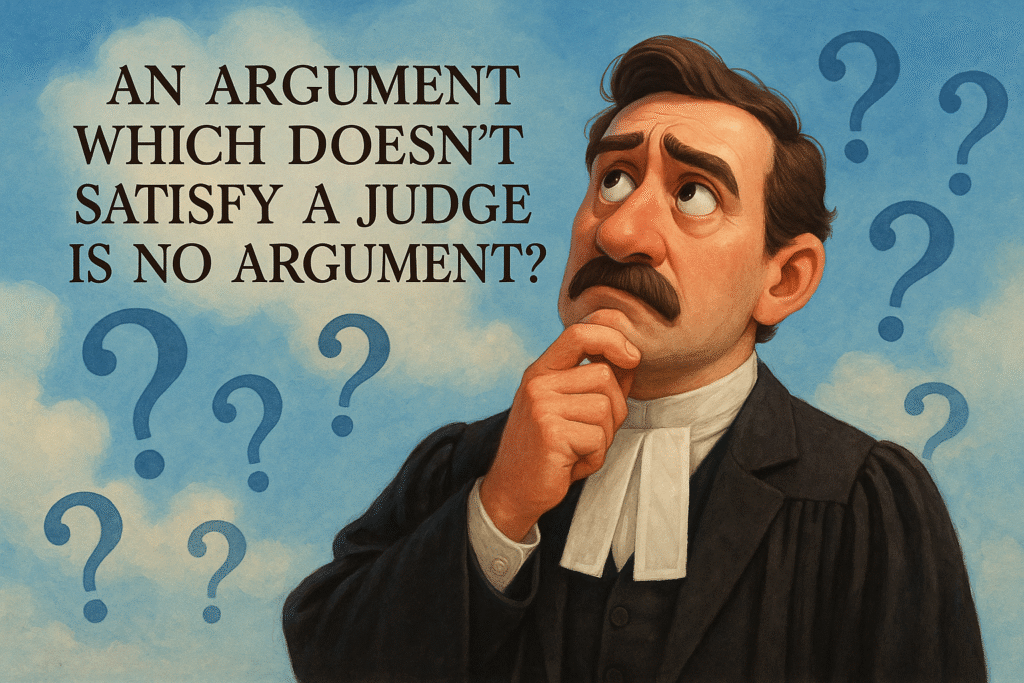By Adv. Sanjeev Rajput | Legal Reflections
Introduction
Some lessons in the legal profession aren’t taught in law school — they’re learned in silence, in the shadows of disappointment, and in moments when justice doesn’t align with effort.
As any practising advocate, I often find myself reflecting on the outcomes of cases long after the court has risen for the day. One thought, in particular, has been echoing in my mind lately:
“An argument which doesn’t satisfy a judge is no argument?”
It’s not a statement, but an introspective question — and an uncomfortable one. Uncomfortable because if it is true, it raises profound implications about the very nature of legal advocacy.
Was the argument weak? Or was it the argument the court was just NOT willing to accept? Where does the fault lie when a well-reasoned submission goes unheard or unacknowledged?
This is one such story.
Recently, I found myself before the Hon’ble Court, fully prepared — not just factually, but legally. I had spent weeks poring over statutes, combing through precedents, and preparing a structured, reasoned argument. Every legal point was supported by binding judgments. The law, as far as I understood it, was crystal clear.
I entered the courtroom, not with overconfidence but with hope — a quiet belief that this was a matter of law, not discretion, and that clarity would prevail.
But what followed shook me.
As I presented my submissions, the judge listened. But the questions began to suggest a different interpretation — one that ran counter to established precedent. I answered respectfully, I cited judgments, I laid out the logic step-by-step. But the bench remained unconvinced.
No matter how sound the foundation, my argument did not satisfy the judge.
And that’s when a question, quiet but piercing, took root in my mind:
“Is an argument which doesn’t satisfy a judge… no argument at all?”
When Effort Meets Silence
It wasn’t the loss of the order that bothered me most — it was the disconnect. The sense that despite doing everything right, something didn’t click. Despite the law being on my side, I could not move the one person whose opinion mattered at that moment: the judge.
This is a situation many advocates face but rarely speak of. When all preparations meet a judicial wall, it can feel like shouting into a void. The feeling is not just professional disappointment — it’s personal. It shakes your faith not just in outcomes, but in the very process of advocacy.
Why Well-Founded Arguments Still Fail
So why do arguments — sound, researched, and precise — sometimes fail to persuade?
1. Judicial Discretion and Interpretation
Even when the law seems settled, the application can differ. Judges bring their own interpretations, past experiences, and judicial philosophies into the courtroom.
2. Judicial Economy
Sometimes, especially in overburdened courts, detailed arguments don’t receive the time or attention they deserve. Orders become brief; nuanced arguments get sidelined.
3. Practical Over Legal Considerations
At times, the court weighs practical outcomes or procedural concerns over strict legal reasoning — an unpleasant reality for the idealist advocate.
A Crisis of Confidence… and a Choice
That day, walking out of court, I questioned my ability. Did I miss something? Was I not persuasive enough? Or — more painfully — does the system sometimes ignore even the clearest law?
But in that moment, I also realised something deeper.
The value of an argument is not always immediate. It may not influence this judge or this case — but it may find resonance elsewhere. Maybe in the appellate court. Maybe in another case where the same issue resurfaces. Maybe in the mind of a young law student reading the judgment and realising what was overlooked.
We Argue Not Just to Win, But to Preserve the Law
Yes, arguments must be tailored to convince the court. But their importance isn’t limited to the order sheet. Every well-crafted submission adds to the legal ecosystem — whether or not it is accepted.
So perhaps the answer to my question isn’t absolute.
” An argument that doesn’t satisfy a judge may not be effective today — but it is still an argument. And sometimes, it is the beginning of something bigger.”
Conclusion: The Question Remains…
So, is an argument that doesn’t satisfy a judge truly no argument?
As a courtroom lawyer, I say — not necessarily.
“A Judge May Rule, But the Law Evolves”
I still believe in the strength of the argument I made that day. And I may make it again — maybe before a different judge, or in appeal, or in the quiet margins of a journal article.
The courtroom may close the file, but the argument often continues its journey — through appeals, law journals, lectures, and the minds of those who still believe in its merit.
The courtroom teaches humility. But it also teaches persistence. Because the arc of law, much like the arc of justice, is long — and sometimes the argument is ahead of its time.
So, to all advocates who walk out of court feeling unheard despite being right — remember:
” You didn’t fail. “
The challenge is to keep making those arguments — not just to win cases, but to shape the law. Even if the answer to the question remains, for now, unsettled.
Author Bio
Adv. Sanjeev Rajput is a Ahmedabad based litigator and writer who reflects on courtroom experiences, legal advocacy, and the evolving practice of law. Through his writing, he aims to bridge the emotional and intellectual journey of litigation.
